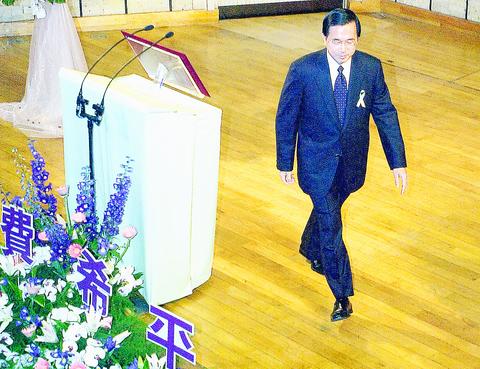The DPP and government heavyweights paid respects to late party stalwart and founding member Fei Hsi-ping (
President Chen Shui-bian (陳水扁) lauded the deceased former lawmaker for his judicious wording of the Taiwan independence clause contained in the DPP's charter.
"During the DPP's extraordinary National Delegation Congress in 1988, the party elite seriously argued the issue of whether to put the clause into the party's plat-form," Chen said in an address at Fei's funeral.

PHOTO: FANG PIN-CHAO, TAIPEI TIMES
Party officials praised Fei's achievements, saying he stood out as a "democratic pioneer" during a time of dictatorship.
"It was Fei, who sat beside me during the congress, who supported my idea of proposing an amendment called `the four ifs' to soften the impact of the clause," Chen said.
The clause listed four circumstances in which the DPP would declare the nation's independence: if the KMT negotiated with the Chinese Communist Party, if China invaded Taiwan, if the KMT government sold out Taiwanese interests, and if the KMT government refused to introduce real democracy and constitutional government.
Chen said that he proposed this amendment during the congress and that Fei's support was crucial to the reaching of a consensus in its favor.
Fei, a mainlander and a former KMT lawmaker who sided with opposition political groups to attack the KMT in the late 1970s, passed away on Feb. 21. He was 86.
Chen said that Fei was not only one of only a few mainlanders devoted to democratization but also a brave politician who confronted the autocratic regime with an instinctive understanding of right and wrong.
"Fei proved throughout his life that the pursuit of democracy, freedom and human rights can transcend ethnic lines," Chen said. "His career also ensured that the society of Taiwan will expect and admire a politician, whether Taiwanese or Chinese, if he speaks and behaves in accordance with justice and his conscience."
Vice President Annette Lu (呂秀蓮) praised the strength of character with which she said Fei fought the alien, autocratic KMT regime. Lu said the former regime should serve as a constant reminder to people who harbor unrealistic expectations of Beijing.
"The different attitudes toward China within Taiwan, with some hostile to China and others adopting the illusion that China is our friend, is the crux of the division within our country over the development of cross-strait relations," Lu said.
The DPP also praised Fei for the considerable assistance he provided to victims of political oppression. It said he was a true patriot unencumbered by ideology.
Fei was born in 1916 in China's Liaoning Province. He graduated from Beijing University and was elected as a legislator in 1948. He maintained the position for 42 years until 1990 when he retired.
During his political career, Fei repeatedly defended Lei Chen (
He campaigned for opposition politicians after the 1979 Kaohsiung Incident.
In 1986, Fei was elected to the DPP's Central Standing Committee.
But unable to identify with the party's march toward independence, Fei broke with the party in 1988. he withdrew from the political scene after moving to the US.

Alain Robert, known as the "French Spider-Man," praised Alex Honnold as exceptionally well-prepared after the US climber completed a free solo ascent of Taipei 101 yesterday. Robert said Honnold's ascent of the 508m-tall skyscraper in just more than one-and-a-half hours without using safety ropes or equipment was a remarkable achievement. "This is my life," he said in an interview conducted in French, adding that he liked the feeling of being "on the edge of danger." The 63-year-old Frenchman climbed Taipei 101 using ropes in December 2004, taking about four hours to reach the top. On a one-to-10 scale of difficulty, Robert said Taipei 101

Nipah virus infection is to be officially listed as a category 5 notifiable infectious disease in Taiwan in March, while clinical treatment guidelines are being formulated, the Centers for Disease Control (CDC) said yesterday. With Nipah infections being reported in other countries and considering its relatively high fatality rate, the centers on Jan. 16 announced that it would be listed as a notifiable infectious disease to bolster the nation’s systematic early warning system and increase public awareness, the CDC said. Bangladesh reported four fatal cases last year in separate districts, with three linked to raw date palm sap consumption, CDC Epidemic Intelligence

US climber Alex Honnold left Taiwan this morning a day after completing a free-solo ascent of Taipei 101, a feat that drew cheers from onlookers and gained widespread international attention. Honnold yesterday scaled the 101-story skyscraper without a rope or safety harness. The climb — the highest urban free-solo ascent ever attempted — took just more than 90 minutes and was streamed live on Netflix. It was covered by major international news outlets including CNN, the New York Times, the Guardian and the Wall Street Journal. As Honnold prepared to leave Taiwan today, he attracted a crowd when he and his wife, Sanni,

Two Taiwanese prosecutors were questioned by Chinese security personnel at their hotel during a trip to China’s Henan Province this month, the Mainland Affairs Council (MAC) said yesterday. The officers had personal information on the prosecutors, including “when they were assigned to their posts, their work locations and job titles,” MAC Deputy Minister and spokesman Liang Wen-chieh (梁文傑) said. On top of asking about their agencies and positions, the officers also questioned the prosecutors about the Cross-Strait Joint Crime-Fighting and Judicial Mutual Assistance Agreement, a pact that serves as the framework for Taiwan-China cooperation on combating crime and providing judicial assistance, Liang